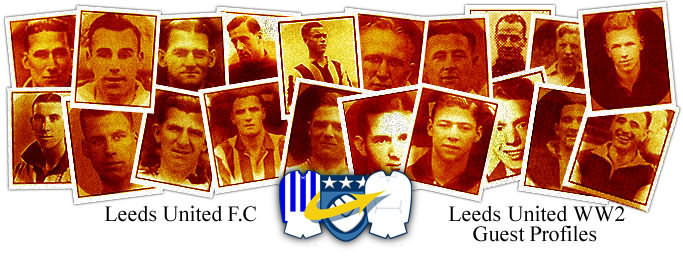

Laking: George Edward (George)
WW2 Guest: 1945-1946
(Leeds United War-time Guest Player Details)
Full Back
Born: Harthill, Yorkshire: 17-03-1913
Debut: v Stoke City (h): 2-12-1945
Height & Weight: Unknown
Laking spent his early days with Kiveton Park and then Dinnington before
moving on to First Division Wolverhampton Wanderers in May 1934. He made his
debut for Wolves in a 1-2 defeat in the First Division by Grimsby Town on 9th
November 1935 and played two seasons there, making twenty-seven appearances in
the League and two in the F.A. Cup, before signing for First Division
Middlesbrough in October 1936. He made his debut for them in the First Division
5-5 home draw on 17th October 1936 with Sunderland and went on to score one goal
in ninety-three League appearances before the outbreak of World War Two,
excluding the three games in the 1939-40 season which were erased from the
Football League records. He made one appearance for Leeds as a guest when he
played at Left Back in the 1945-46 Football League Northern Section game at
Elland Road in a 0-0 draw with Stoke City. He also played for Middlesbrough
during the War he scored one goal in three games in 1941-42, two goals in three
games in 1942-43, but added no more goals in three games in 1943-44, one in
1944-45 and sixteen in 1945-46, scoring a total of three goals in twenty-six
League games. He also guested for Sheffield United, where he played one game in
1941-42, Sheffield Wednesday, where he played twenty-four times in 1941-42, and
once in each of 1942-43 and 1943-44. He also made nineteen appearances for
Doncaster Rovers in 1942-43 and thirty appearances in 1943-44. After the War he
only added one more appearance to his League tally for Middlesbrough, against
Sheffield United at Bramall Lane in a 1-2 defeat on 28th Septemb 1946 in the
First Division. He then retired from League football and joined Non-League
Shrewsbury Town in 1947, where he worked at the Sentinel factory and also played
an active part in the Town's Cricket Club. He was another player whose best days
were taken by the Second World War. He died in 1997.